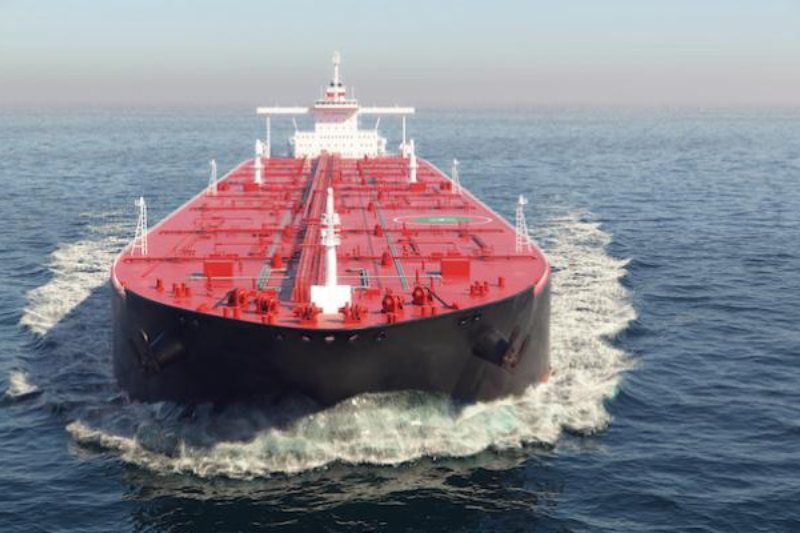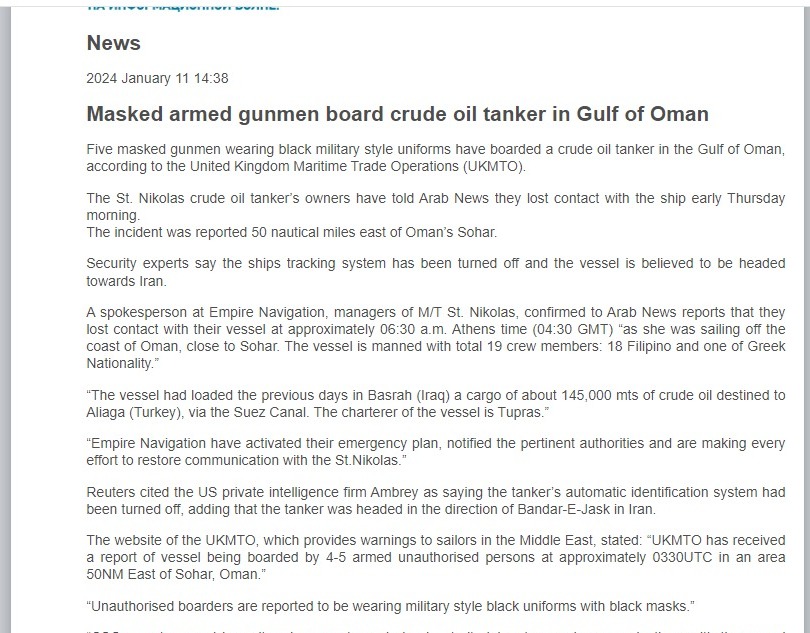
Masked Armed Gunmen Board Crude Oil Tanker in Gulf of Oman: An Analysis
In a startling turn of events, the United Kingdom Maritime Trade Operations (UKMTO) has reported that a crude oil tanker, the St. Nikolas, was boarded by five masked gunmen in the Gulf of Oman. The incident, occurring 50 nautical miles east of Oman’s Sohar, has triggered concerns and raised questions about maritime security in the region.
Unfolding of the Incident
The St. Nikolas, a Crude Oil Tanker sailing under the flag of the Marshall Islands and associated with the Greek shipping company Empire Navigation, lost contact with its owners early Thursday morning. Empire Navigation, managers of the vessel, revealed that the ship, manned by 19 crew members, had loaded approximately 145,000 metric tons of crude oil in Basrah, Iraq, destined for Aliaga, Turkey, via the Suez Canal.
Turning Off Tracking Systems
Security experts have highlighted a critical aspect of the incident—the tanker’s tracking system was deliberately turned off. This deliberate act raises concerns about the intent behind the boarding. Furthermore, the vessel is believed to be heading towards Iran, according to reports from the US private intelligence firm Ambrey.
Keep Reading
UKMTO Reports and Investigation
The UKMTO, responsible for providing warnings to sailors in the Middle East, received a report of armed unauthorized persons boarding the vessel. The unauthorised boarders, described as wearing military-style black uniforms with masks, altered the ship’s course towards Iranian territorial waters, leading to a loss of communication. Authorities are actively investigating the situation.
Ongoing Tensions in the Region
This incident adds to the heightened tensions in the Arabian Gulf, especially in the aftermath of Houthi attacks in the Red Sea. The UN Security Council recently adopted a resolution condemning multiple Houthi attacks on ships. The timing of the boarding incident raises questions about potential connections to the broader geopolitical landscape in the region.

Response from Security Authorities
The ongoing incident has been classified with an amber status on the UKMTO website, indicating a “Robbery, Boarding, Suspicious approach.” The response level may change based on developments. It’s crucial to note that the boarding involved covering surveillance cameras, indicating a deliberate attempt to conceal the identity of the perpetrators.
International Response and Concerns
The incident comes on the heels of the international community expressing concern over Houthi attacks. American and British navy ships recently intercepted 21 Houthi drones in the Red Sea. British Defense Minister Grant Shapps termed the continuation of Houthi attacks as “completely unacceptable” and emphasized a willingness to take direct action against Iran-backed Houthi militia.
Historical Context of the St. Nikolas
The St. Nikolas, built in 2011, has been under scrutiny previously. Suspicions were raised about its cargo, allegedly originating from Iran’s Khargh Island. The vessel’s journey, from the South China Sea to the Texas coast, was marked by secrecy and sudden course changes, leading to a significant fine for Empire Navigation over smuggling sanctioned Iranian crude oil.
As the situation unfolds, it’s imperative to closely monitor developments and the outcomes of the investigation into the St. Nikolas incident. The deliberate turning off of tracking systems and the vessel’s mysterious journey patterns raise concerns about the broader implications of maritime security. This incident serves as a stark reminder of the complexities and challenges faced in ensuring the safety of vital maritime routes.

